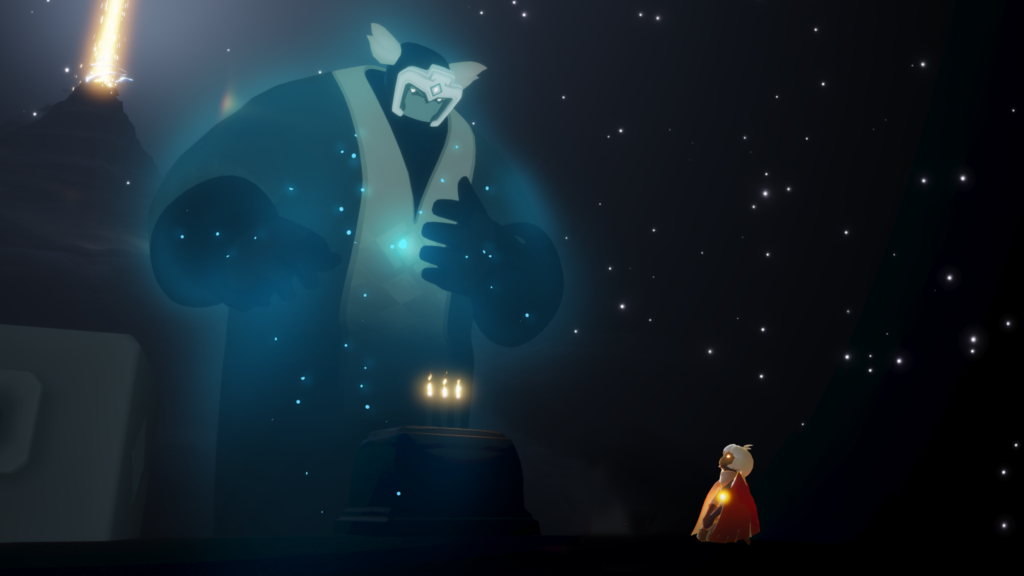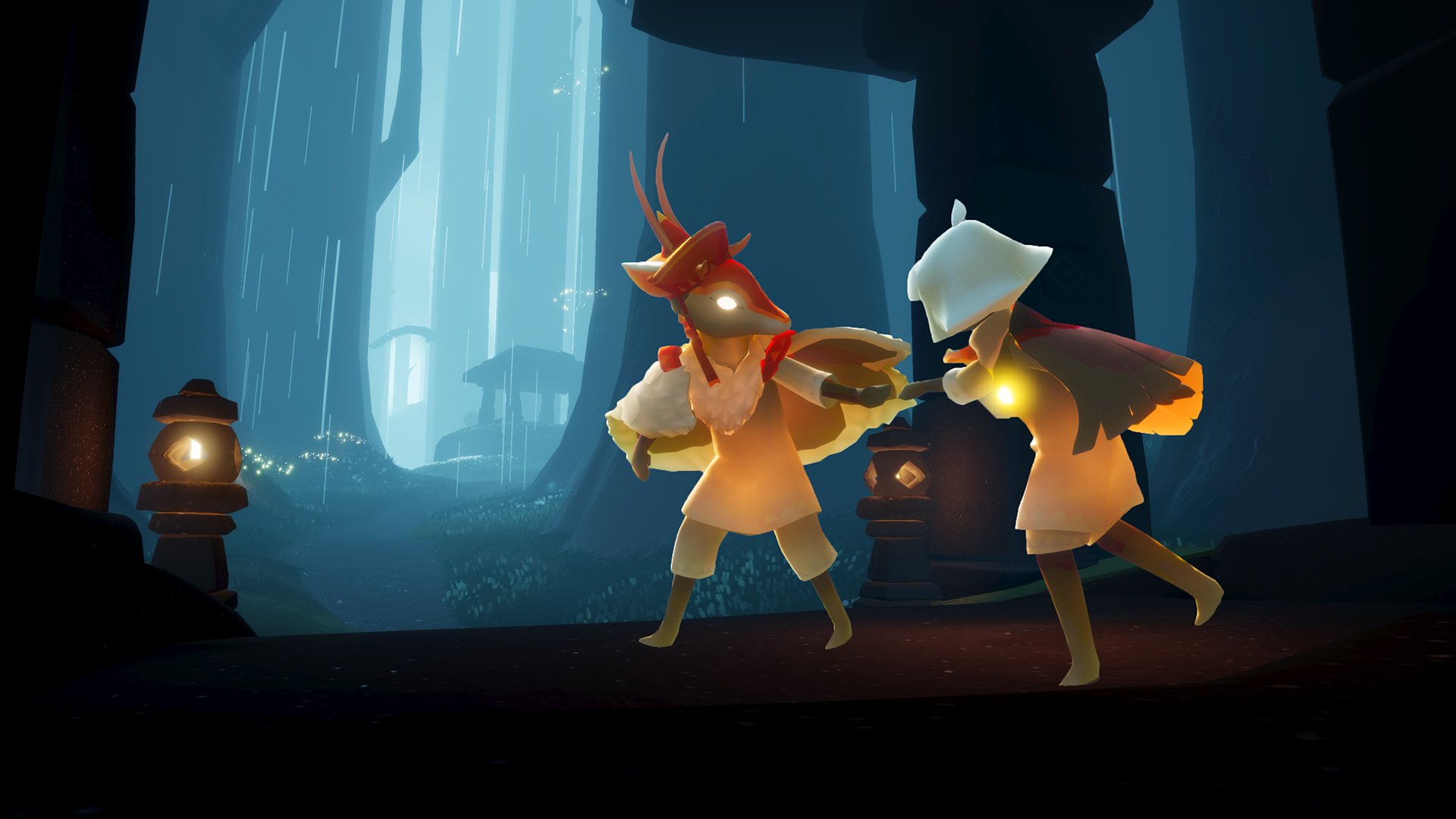
Games are art. And the artistry behind Thatgamecompany’s portfolio, Flow, Flower, and Journey, has reached an empathetic apex that many studios only dream about. The Santa Monica-based studio has earned a reputation because of its singular mission: “Our hope is to expand the range of emotional experiences possible in video games, so that it can be enjoyed and loved by people of all ages, cultures and backgrounds.”
The newest release, Sky: Children of the Light, takes this philosophy to the next level, by explicitly fostering friendship and altruism. Thatgamecompany co-founder and Sky creative director Jenova Chen fully understands the huge risk he’s taking, but he wouldn’t have it any other way.
“I could choose to make more money but it will hurt the integrity of the brand. And therefore I choose the lesser profitable path,” Chen said during a phone interview last week.

Chen wants his games to enrich the lives of people around the world. That’s why he’s gone mobile first with Sky (PC and console will come at a later date), because of the billions of people who already use smartphones, and it’s why he doesn’t believe in gimmicky microtransactions or loot box-style monetization schemes.
“I think there needs to be some level of heroism and also the faith that people would appreciate that we don’t use those schemes, that in the long run they will support our brand better,” he said.
“What I want to do is I want to use our game as an example to show the other developers that there’s other ways to make the players pay for your game. And we want to encourage them to think outside the box and not just follow what is established. We all agree what is established is not really respectable. And we are trying our own way, which is about paying for others, but I believe there are many other potential [avenues] for business model[s] to work in the future.”
There have been a number of indies that have successfully leveraged the premium model on mobile, but free-to-play remains the dominant mobile model by far. Chen said he’s always “kind of shocked” by premium on console and PC “because people will just pay you 60 bucks without knowing anything.”
Sky is free-to-play, in part because it helps the game reach a broader audience, but Chen is optimistic that game creators will still be able to use a premium model in the future.
“[On console, players] will just already trust that you are providing them a [solid] experience. And the reason that mobile is not really premium yet… it’s because there’s not enough trust between the consumers and the content makers. I would hope as time evolves, as more trust has been built, the premium model will still be a viable model for the mobile market,” he said.
Apple Arcade, which is launching this fall, is proof positive that the marketplace can still support indies making premium experiences. Chen said he thinks that Apple’s new subscription service, which emphasizes a highly curated storefront, could be a good opportunity for developers.
Sky is unique in that it actively encourages and fosters friendships with players online in an age where toxicity and griefing is running rampant. Candles, used for awakening the spirits of ancestors, are a kind of currency in the game, and the design actively encourages players to buy candles to give to others as a way of saying thanks and to build relationships. Unlike other games that promote selfish or antagonistic goals, such as building up your own character’s attributes, defeating enemies, and so on, Sky wants you to make friends and help your friends. It’s a pay-it-forward system.
Even with its season passes (Sky will offer new content with new seasons every few months), altruism is encouraged. You can buy one pass for yourself at $9.99, but for just a little more, the Adventure Pass ($15) gives you an opportunity to share a pass to two other players, effectively bringing the cost down to just $5 per player. Fine-tuning an eight-player experience around friendship-building and being selfless has not been easy, and the design choices that Chen and Thatgamecompany made were necessary to ensure players would seek out positivity.
“We say we want to have integrity, which means what you say and what you do is the same. If we say it’s a game about giving but it’s easier to buy it only for yourself, that’s not really living up to the integrity there,” Chen noted.
“So many games put the player in a survival state. You know, in the tribal warfare state, where they can be kind to their friend but they’ll be mean to their enemy. And so in a way, if you don’t do anything about the social dynamics designed in a game, you will have a realistic capture of humans. You will see all kinds of stuff happening. We were trying to find the right angle where the positive side of the human experience can be felt, even through the in-game economy. So what I would say is, people will pay for others. People also are more likely to pay for themselves. But in fact, we don’t encourage you to pay just for yourself.”
Chen doesn’t necessarily believe that humanity will always look towards generosity, but he hopes Sky can show humanity in its best light. This was something that we all witnessed to some extent already in Journey, which enabled players to support one another.
“But Sky is the very first game where it goes beyond the one-on-one relationship and suddenly you have a virtual community,” Chen continued. “How do you handle the jealousy, the kind of back-stabbing, the annoyance, the griefers, attention seekers… We spent a long time looking into the social dynamics of players and trying to use the design to capture what I think was a very beautiful moment. [It’s a little] like a good perspective, like a good angle. Some actors say, I’m only good looking from this angle, and so we’re trying to take a beautiful shot of humanity using the design.
“Making a multiplayer game is like a social study. It really reveals a lot of learning and perspective on my own take on humanity. Humanity is like a real life photograph. It’s gray, it has grain, it has noise, it has shadows and light. That’s the entirety of humanity.”
Sky is off to a very good start already with more than one million downloads in its first five days, according to Sensor Tower, but as Chen was quick to point out, with free-to-play, downloads does not equate to revenue. In an LA Times interview, he remarked that he has a lot of fear about Sky’s reception and Thatgamecompany’s mission overall. With glowing reviews on the App Store, and downloads continuing to grow, Chen told GameDaily that his fear is “eased but not completely gone.”
“You don’t really necessarily know until a few months later,” he said. “I mean, having downloads is great, but we have to see how long they will play the game and, you know, over time, would they recruit their friends to play the game? From a dev’s perspective, it’s still kind of unnerving to watch how things are developing every day.
“[But] seeing how people are responding and seeing people having tears of joy playing our game multiple times, that’s just very thrilling to know that I didn’t let people down this time,” he added, noting that he had been concerned about a kind of sophomore slump.
Financial success is not guaranteed, of course, but Chen and his team must feel emboldened when they hear stories of much older players thoroughly relishing the game experience. It’s a sure sign that Thatgamecompany is succeeding on its mission to make games broadly accessible.
“We got an email from Hawaii [from] an old lady who is 67 years old,” Chen recalled. “She said she was never a gamer, but seeing the game promoted on her phone, she was curious and started playing. And when she reached the climax of the game, she cried and she told me that she’s very thankful that the game reminds her how she still has the power to love in her… Not only did she finish the game, she also got the message. Seeing letters like that, it just makes you feel like you’re working on something that’s worthwhile.”
There is certainly a sense from some in the games business that too much of the industry is creating games in a bubble. Conan O’Brien’s “Clueless Gamer” segments exist because most games are not easily accessible to all ages. If you’re under 40, you probably know how to use a PlayStation or Xbox controller with your eyes closed, but that’s not the case for a huge portion of the global population.
Chen acknowledged that it’s been a constant battle for Thatgamecompany to utilize non-standard controls. “We’ve been championing a control scheme which is based on flicking because every person who has used a touch screen has flicked a webpage at one point,” he said, adding that while the mobile version uses virtual sticks, the iPad version kept the old flick-style controls (and that’s probably the version the 67-year-old woman played).
Controls aside, the bigger problem with this bubble that the industry appears to be in is that games, on average, don’t resonate with people emotionally, Chen argued.
“A lot of people don’t look at the games industry through the lens of feelings,” he said. “Up until today, we are still categorizing games based on software terms, like first-person shooter versus third-person shooter. Role playing games versus massively multiplayer online role playing games. It’s treating it like software but if you really think about it today, gaming is entertainment and if you look at entertainment, when people recommend a movie to watch, they don’t care if the movie is shot in 3D or 2D.
“They care about what type of feeling they are looking for when it comes to entertainment. So do you like horror films, or do you like comedy? You know, do you like romance? It’s about how it makes you feel.”

The other major problem, Chen said, is that game makers continue to perpetuate the stereotype that games are just for boys and young men by continually making content for that audience alone.
“I remember 15 years ago, we were talking about how the average age of the gamer was already thirty-five years old, according to the ESA data. [So many thought] very soon gaming’s just going to be accepted by everybody, old and young. And it’s 15 years later. Is the average age of a gamer 50? I don’t think so. What does that mean? It just says once you’re older, you don’t have anything emotionally relevant to you from the entire game industry,” he remarked.
“That’s why I feel particularly passionate about exploring and creating the emotional experience that older men or younger women or older women would be interested in. So we don’t get [misunderstood] as this thing only for kids.”
Thatgamecompany’s aesthetic isn’t boxed in by guns and violence — in fact, it’s deliberately non-violent. Chen isn’t condemning violence in games, but he does think that blending of existing genres is too easy for designers.
“The inter-genre innovation is relatively easy, the hard one is really to push out something that people are not comfortable with,” he said.
“The only family and female relationship game I can think of is The Sims. And it’s very successful in its own genre, but I’ve never seen any other game that solicited these feelings. So it’s like we need to have people venture out to go to the wild to find these new continents, [or] a new state. Eventually once all the emotions are covered, then no one will say, ‘Are you a gamer or not?’ They will say, ‘What mood are you in for games?’”
Chen’s passion for games as a 21st century artform is admirable. Not only is he continuing to take chances with his own studio, but he also has helped Annapurna Interactive with fundraising and advising. Annapurna’s games like What Remains of Edith Finch, The Outer Wilds, and others are perfectly in alignment with Chen’s mission at Thatgamecompany.
“That’s my only purpose, living every day trying to make this happen,” he commented. “We want to help artists who are really trying to drive the medium forward and to push the boundary of what emotion is capable [of doing for games].”
Part of the emotion that Chen is striving for is spiritual in nature. For many players, Journey was a somewhat spiritual experience. Similarly, in Sky, which sees players awakening ancestral spirits, the theme is hardly nuanced, but does not bang the player over the head with any specific religious doctrine. For Chen, the ultimate goal is to simply bring people together.
“I think we are living in a modern society where our lives are more and more connected through social media and technology. However, we are feeling more and more alone,” he lamented. “We are a species that thrives on having relationships and community… It’s not like I just wanted to be spiritual for the spiritual sake, [but] it’s more like my feeling about the well-being of [society]. Part of the reason I wanted [to make] Journey and Sky is I felt that we can’t trust each other to be vulnerable to each other.
“Some people say like, this is what church [or religion] is for. You have a place where people all believe in the same values and they won’t judge you based on your label. They would accept you for who you are so you can open yourself up to talk about these things you wouldn’t in a bar or in a class or at work. And I felt like, yeah it’s been a very long time since I remembered that I was able to talk freely outside of my family and closest friends.”
In the end, Chen sees the human connection and spirituality going hand-in-hand. We are all living on this planet and we all will die. That’s a universal truth that connects us.
“We ask ourselves, why are we here? Why are we here alone on this planet? What’s the purpose? Where are we going? What kept our life meaningful? And you know, any artistic creator will be asking these questions. And I have been asking these questions, and I’m trying to make a game to discuss these subjects,” he said.
Thatgamecompany’s mission to evolve the medium does appear to be working. Journey, itself, has become a huge inspiration for numerous developers since its 2012 release. Rime, from Tequila Works, is one such example. It’s an incredibly emotional experience that had a big impact on me. It’s also an experience that Thatgamecompany was close to making.
“We joke about Rime, that it’s actually the game that we should have made, because you know, in terms of art style, the theme, the exploration, it’s very much Journey-esque. It took several years to make Sky otherwise we would have made Rime ahead of Rime,” Chen said.
In a maturing industry that’s seen the rebirth of the indie game developer, Chen — whether he likes it or not — has become someone to look up to. While worsening discoverability has made the ecosystem incredibly challenging for indies today, Chen’s best advice is to simply pursue originality.
“Looking at Netflix and what’s happening with the music industry [tells us a lot] about the future. The future of gaming is not about the platform, but about the channel, about the genre. Emotionally [there’s] still a gold mine… we have not fully discovered, “ he said. “The biggest reward is in finding the treasure in the blue ocean, not deep in the red ocean with the giants.”
 GameDaily.biz © 2025 | All Rights Reserved.
GameDaily.biz © 2025 | All Rights Reserved.